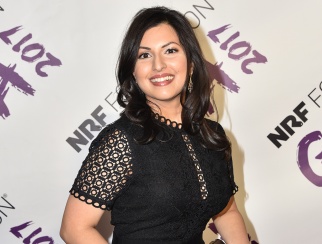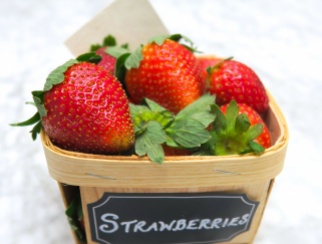Food waste is a big environmental challenge. Kavita Shukla, an inventor and entrepreneur who was named to The List of People Shaping Retail’s Future earlier this year, is making a product to solve the problem. FreshPaper helps food stay fresher longer, reducing the likelihood that it ends up in a landfill.

FreshPaper founder Kavita Shukla was honored at the NRF Foundation Gala 2017 as a “Dreamer” on The List of People Shaping Retail’s Future. Nominations for 2018 are now open: Tell us who’s on your List.
Shukla got the idea for FreshPaper when she was just 12 years old; the product is now revolutionizing the shelf life of fruits and vegetables across the globe. In advance of Earth Day 2017, Shukla spoke with us about the current state of food sustainability, what’s next for FreshPaper and the role retail can play in reducing food waste.
How did you come up with the idea for FreshPaper?
FreshPaper began as my middle school science project, inspired by my grandmother. When I was visiting my grandmother in India, I accidentally drank some unfiltered tap water. My grandmother gave me a homemade mixture of spices as remedy, and I ended up not getting sick. That experience sparked my curiosity, and when I got back home to Maryland, I started a simple science project to learn more about the spices my grandmother used. After tinkering around in my garage with jars of dirty pond water and spices, I eventually discovered that some of the spices seemed to stop the growth of bacteria and fungus, and I created FreshPaper, a new way to keep food fresh for longer.
When did you to decide that food sustainability was your passion?
Five years ago, I set up a stall at my local farmer’s market with the hope of helping my local community have greater access to fresh, healthy produce with my invention. I never could have imagined that one day, FreshPaper would land on the shelves of the largest retailers in the world.

What most people don’t know about FreshPaper is that for years, it went nowhere. When I first got the patent for FreshPaper, I was so excited to set up a nonprofit to reach places in the world that didn’t have access to refrigeration. But I soon learned how hard it can be to give something away for free. Like many aspiring entrepreneurs, I was told that I needed more experience, more degrees, more money — more than I had, and more than I was. So I gave up.
But one Saturday morning, more than a decade after I first started working on my middle school science project, I decided to give my idea, and myself, one last chance. I stayed up all night and handmade a batch of FreshPaper in the tiny kitchen of my studio apartment and set up a stall at my local farmer’s market, handing out sheets to anyone who would stop by. We started with $300 in paper-making supplies — we had no funding, no marketing budget and no experience. But just a few months later, we were taking wheelbarrows full of FreshPaper to our tiny local post office and shipping FreshPaper to retailers, farmers and families across the country.
What surprised you most about the current state of food sustainability?
Despite all the technology we have today, more than one-third of our world's food supply is lost to spoilage. While the world's farmers harvest enough to feed the planet, 800 million people go hungry every day and over 1 billion people live without access to basic refrigeration.
“Visionary retailers can direct their tremendous strengths ... to drive adoption and scale of mission-driven innovations, changing their customers' lives and transforming communities.”
How could retailers help reduce food waste?
Our national retail landscape is unmatched in reach; the potential to educate consumers and provide sustainable, affordable solutions is enormous. Visionary retailers can direct their tremendous strengths — customer loyalty and trust, powerful storytelling, broad geographic reach, product authority — to drive adoption and scale of mission-driven innovations, changing their customers’ lives and transforming communities. I’m so excited about how our retail partners like Whole Foods, Walmart, Amazon and HSN are giving us a platform to take our mission to places we could never have imagined.
With four patents and numerous international accolades, what’s next for you and for FreshPaper?
The awareness and scale that our retail partnerships have afforded now enable us to think bigger. Our mission is “fresh for all,” and we believe that simple innovations like FreshPaper can make our food system not only more sustainable, but more accessible. We’re now partnering with some of the largest retailers in the world to integrate FreshPaper into food packaging from farm to fork. We’re also very excited to be working with food banks in the United States and NGOs in the developing world. In the next few months, we’re launching new innovations through our retail partners to bring simple, sustainable design to the masses.
What advice do you have for people who want to become involved in creating solutions for food waste and sustainability?
Just take the first step with your idea. Bringing my invention to the farmer’s market and giving it to people who could actually use it shifted the entire trajectory of my simple idea.